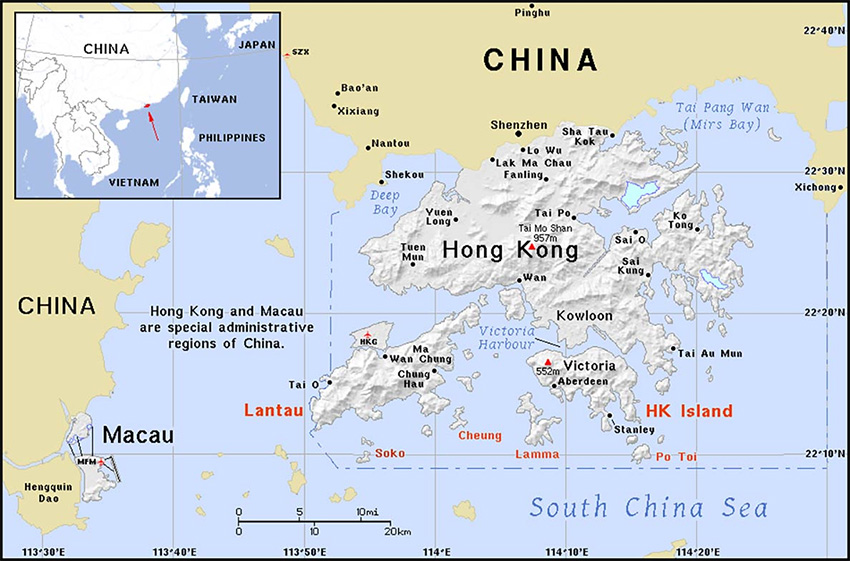International Relations
Changes in Electoral System of Hong Kong
- 16 Mar 2021
- 6 min read
Why in News
Recently, China has made changes in Hong Kong’s electoral system.
- The measures are part of China’s efforts to consolidate its authoritarian grip over Hong Kong Special Administrative Region (HKSAR) following the imposition of a national security law in June 2020.
Key Points
- The New Electoral System:
- Increased Membership of the Legislative Council:
- The number of Hong Kong’s Legislative Council (HKLC) members will be increased to 90, with the additional members also nominated, thereby reducing the share of elected representatives.
- Currently, only half of the 70 members of HKLC are directly elected and the rest are nominated.
- Expansion of Election Committee:
- The Election committee (Hong Kong electoral college) has been expanded to include Beijing-nominated members.
- The Election Committee, as previously, will be responsible for electing the Chief Executive, and will also choose some of the members of HKLC.
- New Candidate Qualification:
- The selection of “patriots” will be ensured by the setting up of a new candidate qualification review committee.
- Increased Membership of the Legislative Council:
- Implications:
- The change will give Beijing-appointed politicians a greater say in running the Hong Kong Special Administrative Region (HKSAR), marking the biggest change since the handover in 1997.
- An increased number of pro-Beijing officials would weaken the power of the opposition to influence the city's leadership.
- It will erode the political freedoms that distinguished Hong Kong from the mainland under the “one country, two systems” model.
- Implication for India:
- Hong Kong is a destination for re-export of Indian goods to the global market.
- Hong Kong is the fourth largest export market for India.
- India is of the view that Hong Kong can play an important role in strengthening ties with China, as it is considered a gateway to China.
- Thus, global tensions due to political unrest in Hong Kong carry consequences for India’s trade with the rest of the world, as well as with China.
- Hong Kong is a destination for re-export of Indian goods to the global market.
- Criticism:
- The European Union has condemned the change and warned China of broader sanctions.
- The G7 termed this move a step towards eliminating dissenting voices and opinions in Hong Kong.
- All major economies such as the USA, UK, Australia have condemned the move and have urged China to allow a more participatory and representative form of system.
- The change is non-compliance with the Sino-British Joint Declaration.
Sino-British Joint Declaration
- About:
- It is a treaty signed between the United Kingdom and China in 1985 on Hong Kong under Chinese sovereignty.
- According to the treaty, China would reassume control of Hong Kong, which was occupied by Britain after the Opium War in 1840, from July 1, 1997.
- Opium Wars: The Opium Wars were two wars fought between the Chinese Qing dynasty and European powers. Both the wars were a result of the Qing Dynasty’s attempts to curb the opium trade.
- The first was fought from 1839-1842 and the second one from 1856 – 1860.
- Opium Wars: The Opium Wars were two wars fought between the Chinese Qing dynasty and European powers. Both the wars were a result of the Qing Dynasty’s attempts to curb the opium trade.
- Provisions:
- It stated that China's basic policies regarding Hong Kong "will remain unchanged for 50 years" and ensured a high degree of autonomy to Hong Kong. These policies are stipulated in the Basic Law, the city’s mini-constitution.
- Under the Basic Law the Constitution that has governed Hong Kong since 1997 the HKSAR is a part of China but enjoys “a high degree of autonomy” and “executive, legislative and independent judicial power”, except in foreign policy and defence.
- It also says “the socialist system and policies shall not be practised” in Hong Kong for 50 years.
- It held that Britain would be responsible for the administration of Hong Kong until 1997 and the Chinese government would give its cooperation.
- It stated that China's basic policies regarding Hong Kong "will remain unchanged for 50 years" and ensured a high degree of autonomy to Hong Kong. These policies are stipulated in the Basic Law, the city’s mini-constitution.
Way Forward
- The new legislation has been seen as the final nail in the coffin for Hong Kong's pro-democracy movement and an erosion of the autonomy guaranteed to the city when it was handed over to China in 1997.
- With the national security law and the new electoral changes, the space for the pro-democracy opposition in Hong Kong has been drastically reduced.
- China must act in accordance with its legal obligations and respect fundamental rights and freedoms in Hong Kong.





